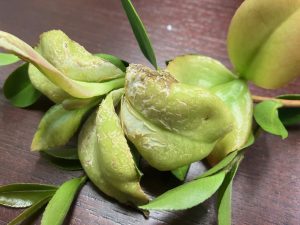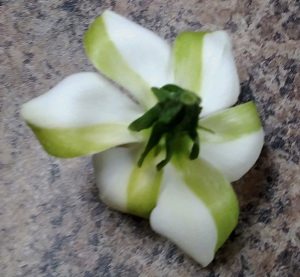Extended spring weather with cool nights and frequent rain can be enjoyable for humans, but does strange things to plants, especially if dormant fungi are hanging around. Exobasidium vaccinii is a fungus that is believed to overwinter as spores attached to bark and bud scales. It can cause infection with the opening of buds in spring, creating odd shaped leaves and flowers that are referred to as galls. Infection is dependent on high humidity and moisture during bud break. Gall growth is due to plant cell division resulting from the stimulus of hyphal growth within host tissue. When galls are still soft, the fungus grows between epidermal cells, breaks the cuticle, and sporulates giving the gall a white cast. Either all or part of a leaf may become thickened, fleshy, and covered with a white bloom of spores. At first, diseased leaves are succulent and white, but they later shrink into hard, brown, gall-like bodies. Galls are composed of fungus-infected plant tissue. Older leaves are resistant to infection. Exobasidium vaccinii is most common in azaleas and camellias.
But, other Exobasidium species are floating out there, and with just the right conditions they can deform other plants. That’s what caused this odd formation on one flower of a gardenia plant. In this case, the spores fused the sepals to the petals of the flower.
While chemical controls are available, they would need to begin before symptoms appear and continue until the gall dried completely. It may be an option for the fastidious weather watcher with a good working knowledge of this disease. But, for the rest of the population, removing and destroying galls before they turn white is the best management practice to avoid having spores form and hang around until next spring. Proper pruning of the plants to improve air circulation will also reduce the chances of favorable conditions, should there be an extended cool, wet season next year.
- Watch for “Melting Grass” - February 19, 2025
- Palms Can Suffer in the Cold - January 30, 2025
- Camellia Care - January 9, 2025


